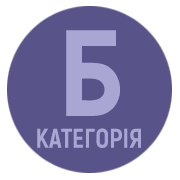PHRASEOLOGICAL UNITS WITH THE ‘UNREAL BEING’ COMPONENT IN UKRAINIAN AND ENGLISH LANGUAGES BASED ON THE CLASSIFICATION OF CULTURAL ETHNOCODES
DOI:
https://doi.org/10.32782/philspu/2024.7.1Keywords:
phraseological unit, unreal being, mythological ethnocode, demonological and anthropomorphic ethnocode, religious ethnocodeAbstract
In the modern linguistic paradigm, domestic and foreign linguists study the code in different dimensions, namely, they address the issues of the culture code, linguistic and cultural code, spiritual code of culture, linguistic code, language code of culture, communicative code, ethnocode, ethnomacrocode, ethnosubcode of culture, etc. However, the typological definition of phraseological units with the component ‘unreal being’ in Ukrainian and English languages based on the classification of cultural ethnocodes has not been touched upon in these scientific works and has not been the object of study in modern linguistic studies, which determines the relevance of our work. Purpose of the scientific study is to analyse the names of unreal being based on the classification of ethnocultures actualised in the phraseological units of Ukrainian and English and to compare the identification of the analysed component in two different languages. The demonological and anthropomorphic ethnocode of culture in the Ukrainian language includes the following names of unreal beings: бенеря, біс, бісик, відьма, гаспид, диявол, дідько, лунь, чорт, and in the English language they include brownie, damn, demon, devil, evil, ghost, Lucifer, spirit. The following names of unreal beings belong to the religious ethnocode of culture in the Ukrainian language: Адам, Бог, Господь, Каїн, and in the English they include the following: Adam, angel, God, Lord, Methuselah, prophet. The plural of the names of the mythological ethnocode of culture in the Ukrainian language is made up of the following names of unreal beings: Амур, Ахілес, Геркулес, жар-птиця, Купідон, Пандора, сфінкс, in English, the plural includes the following: Achilles, Damocles, genie, Pandora, Robin Hood. The scientific novelty of the study lies in the substantiated typology of phraseological units with the component ‘unreal being’ on the material of Ukrainian and English based on the classification of cultural ethnocodes. The phraseology of the Ukrainian and English languages has many common unreal beings: Адам – Adam; Бог, Господь – God, Lord; біс, бісик, бенеря, гаспид, диявол, дідько, чорт – demon, devil, Lucifer; Ахілес – Achilles; Пандора – Pandora which is due to adequate biblical beliefs, demological images and the identical borrowing of the names of beings from ancient Greek mythology. the Ukrainian phraseology contains unique unreal beings: відьма, жар-птиця, Каїн, лунь which were formed on the basis of Ukrainian myths, fairy tales, parables, legends, stories and epics. Names of beings from ancient Roman (Амур, Купідон, Геркулес) and Greek (сфінкс) mythology were also borrowed into Ukrainian phraseology. The names of unreal beings such as angel, damn, ghost, spirit, evil, Brownie, Methuselah, prophet are based exclusively on the material of English phraseology. These beings are celestial, incorporeal forces and demonological representations. It can be stated that ethnocode of culture based on Ukrainian phraseology are characterised by the desire to reflect in figurative metaphorical expressions, to objectify, make more real and understandable conditionally real beings and phenomena – people, birds. The English phraseological representation of the ethnocode of culture is marked by the desire to metaphorically objectify mostly unnatural beings and phenomena, fantastic, incorporeal.
References
Селіванова О. О. Міфологемна мотивація номінативних одиниць (на матеріалі української мови). Мовознавство. 2006. № 6. С. 41-51.
Снитко О. С. Коди культури у мовній об’єктивації дійсності. Studia Linguistica. 2008. Вип. 1. С. 115-121.
Clotaire Rapaille. The Culture Code: An Ingenious Way to Understand Why People Around the World Live and Buy as They Do. Crown, 2007. 224 p.
Андрейчук Н. І. Мова і культура у контексті системного підходу в науках про людину. Вісник Львівського університету. Іноземні мови. Львів : ВЦ ЛНУ ім. І. Франка, 2010. Вип. 17. С. 169-175.
Шарманова Н. М. Духовний код як лінгвокультурний еталон нації (на матеріалі паремійних кліше). Філологічні студії. 2017. Вип. 15. С. 81-104.
Бацевич Ф. С. Духовна синергетика рідної мови: лінгвофілософські нариси: монографія. Київ : Академія, 2009. 192 с.
Ісаєвич Я. Д. Мовний код культури. Київ : Вища школа, 1997. 458 с.
Дев’ятко Н. В. Міфологічний образ України як втілення комунікативного коду національного інформаційно-культурного простору. Гілея: Науковий вісник. 2012. Вип. 57 (2). С. 418–424.
Савченко Л. В. Етномакрокод духовної культури як репрезентант фразеологічної картини світу. Лінгвістичні дослідження. 2014. Вип. 38. С. 36-42.
Бацевич, Ф. С. Словник термінів міжкультурної комунікації. Київ: Довіра, 2007. 205 с.
Савченко, Л. В. Феномен етнокодів духовної культури у фразеології української мови: етимологічний та етнолінгвістичний аспекти. Сімферополь: Доля, 2013. 600 с.
Селіванова О. О. Лінгвістична енциклопедія. Полтава : Довкілля, 2011. 844 с.
Загнітко А. Сучасний лінгвістичний словник. Вінниця : ТВОРИ, 2020. 920 с.
Бевз Ю. Фраземи з компонентом ‘міфологічна істота’: типологія і лінгвокультурологійний коментар. Лінгвістичні студії. 2023. Вип. 45. С. 150-161.







